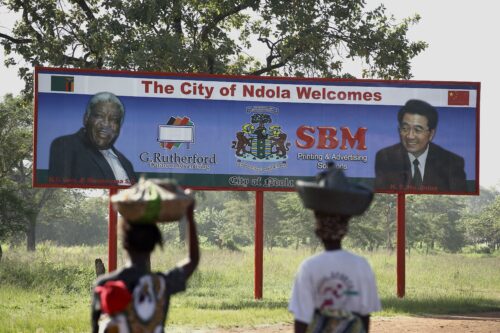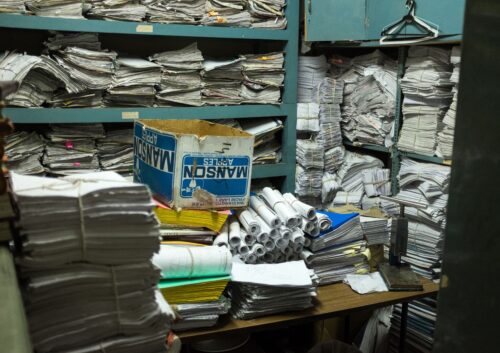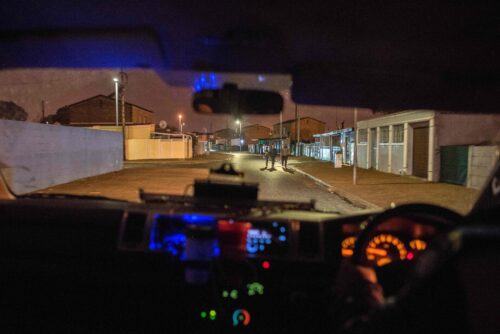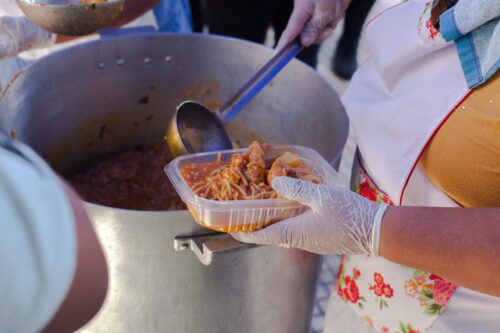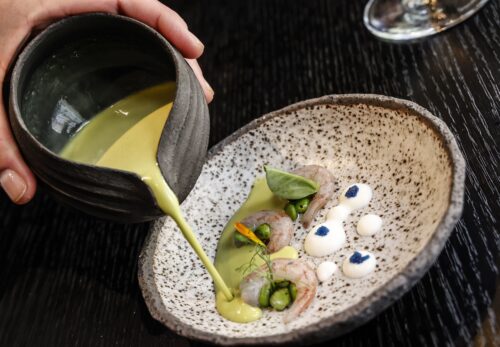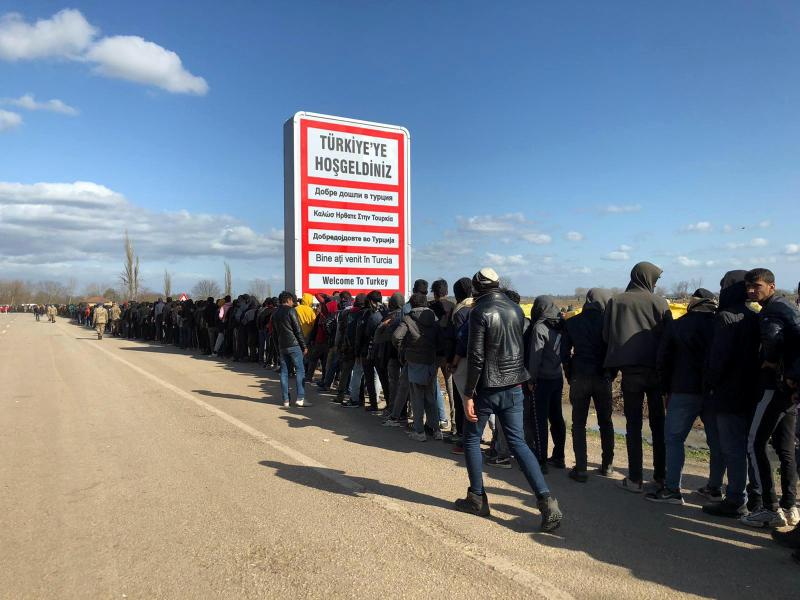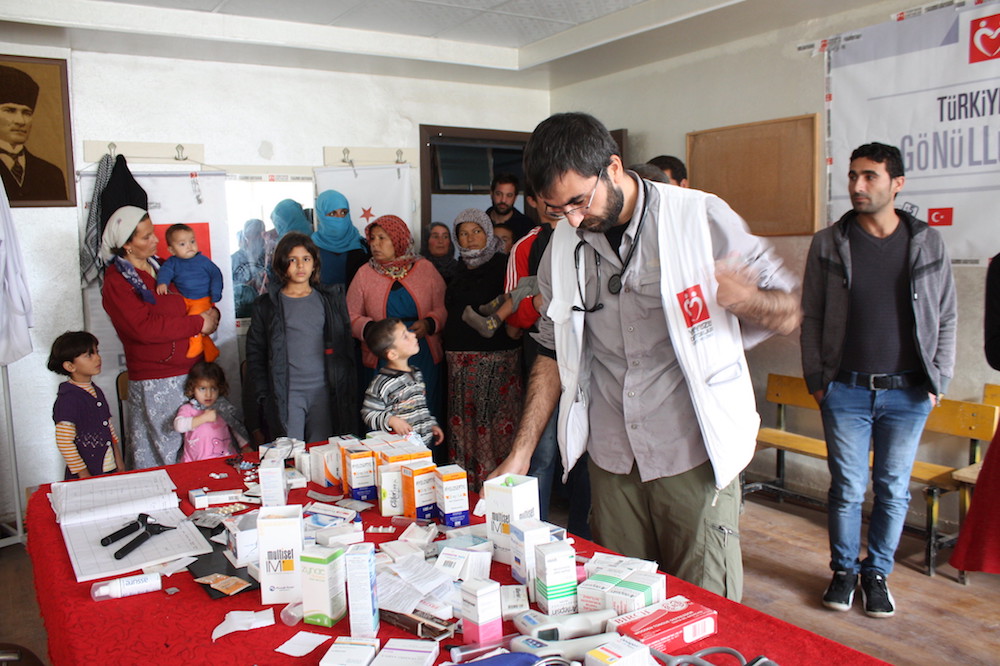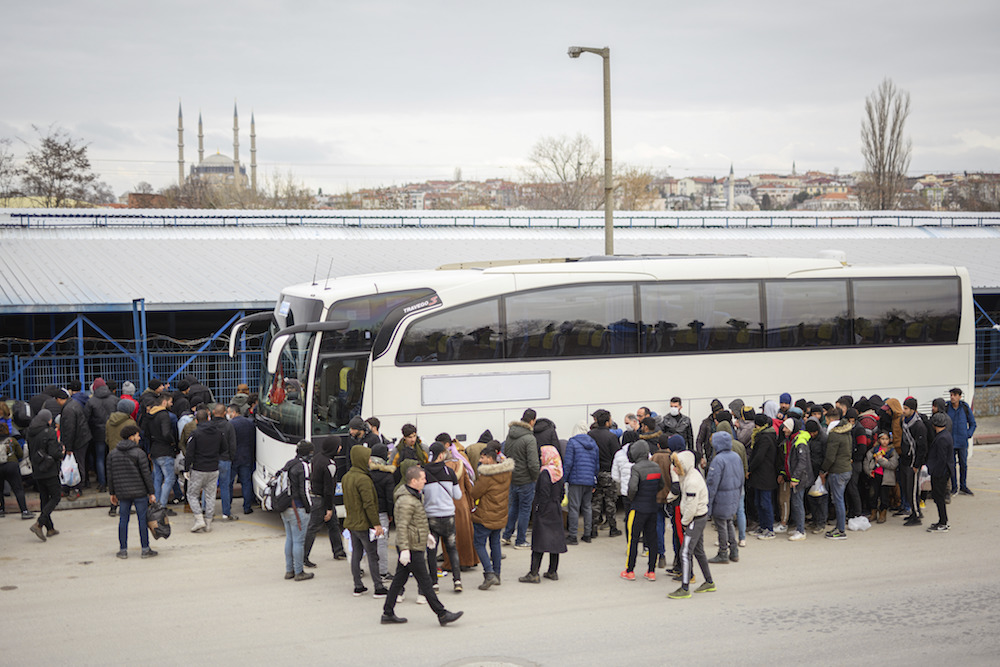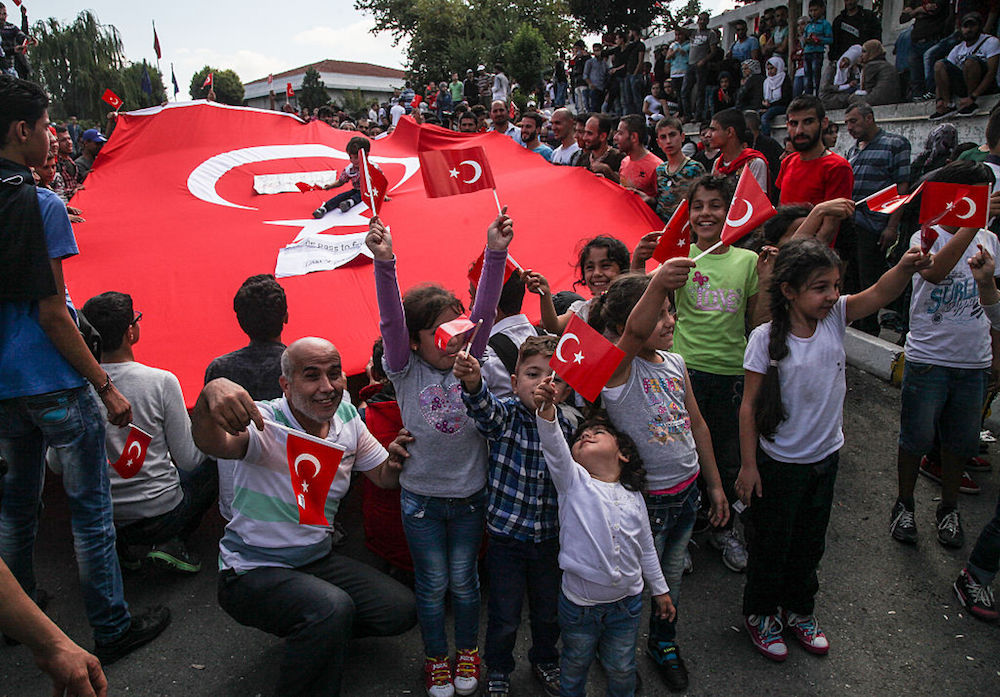When the “Gift” of Immigration Comes With Strings

A year ago, I found myself trying to ease the tension rising in a makeshift classroom in Istanbul, Turkey, where I was a volunteer teaching Turkish grammar to a group of migrants and refugees. My students suddenly switched to Arabic as a political debate started over whether Turkey was a welcoming host or not. Ahmed, a queer refugee from Syria, clearly expressed his opinion that it was: “They accepted us,” he said, simply. “May Allah bless Turkey!” [1] [1] All names of interviewees and students have been changed to protect people’s privacy. Others were not so sure.
Today Turkey hosts the largest number of refugees worldwide. Since 2011, the country has had an open-door policy and now accomodates more than 3.5 million refugees and asylum-seekers who have fled the Syrian conflict and hundreds of thousands of others who have come from surrounding regions. For many, Turkey’s President Recep Tayyip Erdoğan represents a father figure, a strong leader in the Middle East who opened the country’s doors, in stark contrast to next-door neighbors in Fortress Europe and the Gulf’s oil-rich countries. Erdoğan takes pride in Turkish hospitality. “In our culture, a guest is an honor and a blessing,” he has said several times in speeches addressed to refugees. “You are never a burden for us.”
In other words, Turkey presents itself as a benevolent state that offers a very valuable gift to refugees: safety and acceptance. Ahmed certainly felt this way.
But as a cultural anthropologist originally from Turkey myself—now working on my degree in Canada—I see this framing of immigration as a “gift” as problematic. The offered acceptance, whether it is in the form of a tourist visa, work permit, or asylum application, is not as all-encompassing as it may at first seem: It often comes with caveats or seems to be only temporarily, begrudgingly given. And turning the opportunity of escape into a “gift” puts an unfair burden of indebtedness onto already vulnerable migrants.
More than this, there is a huge amount of hypocrisy in Turkey. Erdoğan largely ignores the fact that Turkey has been embroiled in the ongoing crisis in Syria since 2011. An overwhelming majority of Syrian refugees fled their country to escape the Bashar al-Assad regime’s catastrophic violence. While Turkey’s staunch anti-Assad stance, in my view, is right and necessary, hundreds of thousands of people were displaced as a result of Turkey’s several military operations in northeast Syria, alongside the incursions of rebel groups affiliated with the Turkish-backed Free Syrian Army (also known as the Syrian National Army). Turkey is partly responsible for the displacement of many hundreds of thousands of the civilians now “welcomed” into the country.
Despite Turkey’s apparently open arms, immigration is all too often framed as a debt rather than as a human right. Hospitality should be the norm, presented without obligation—not a gift that requires repayment.
The anthropological literature on gift exchange and reciprocity is vast. Perhaps among the most famous is Marcel Mauss’ 1925 essay The Gift. Nearly a century has passed since this work was published, yet Mauss’ theory is still relevant. In his analysis, Mauss identifies three notable principles of gift exchange: to give, to receive, and to reciprocate. Each is obligatory.
According to Mauss, the act of gift-giving lays the foundation of most social relationships and permeates all economic and moral aspects of life. He says that “a gift is received with a burden attached,” one that constitutes a form of debt. “The unreciprocated gift still makes the person who has accepted it inferior.”
Hospitality in the context of migration can be seen as a form of exchange between a creditor and debtor: The host, as the creditor, offers hospitality in the form of a “gift” with certain expectations attached; the guests, in return, become debtors. The gravity of their debt grows if they fail to meet those expectations.
The making of indebted citizens through state benevolence in Turkey has been well-documented by my friend, anthropologist Çağrı Yoltar, who has outlined how the distribution of social assistance programs to Kurdish populations has made them indebted to the Turkish state. Her work inspired me to think along the same lines for migrants.
Many people coming to Turkey have expressed feelings of indebtedness. A United Nations Refugee Agency news article, for example, reports that 18-year-old Syrian refugee Eilada said, after reaching a refugee camp in 2012: “We receive three hot meals a day. We owe the Turkish government so much for their support.” She added: “I want to work for a while in Turkey before I go back home. I want to pay back some of the Turkish hospitality in hosting us.”
This sense of indebtedness can be seen in immigrant populations around the world. In January, the Afghan Hazara refugee community in Australia raised AU$160,000 to help regions hit by devastating bushfires. “We really owe Australian society a lot,” they said to news agencies when presenting their donations. “Owe” is a strong word to use.
The idea of “giving back” also recurs. Syrian migrant Basel Abou Hamrah told a Canadian Broadcasting Corporation reporter he “feels indebted to this country.” While volunteering to support other LGBTQI refugees, he said his new home “brought me here, so I have to give back.”
Of course, feeling obliged to give back is not necessarily a problematic thing. Immigrants who feel a strong sense of gratitude to their hosts may express that through joyful nationalism and altruistic behaviors. Reciprocity can be a glue that helps hold a society together, just as it plays an important role in the development of social relationships.
But for some—and I see this especially in Turkey—the expectation of gratitude from immigrants is hypocritical and invokes an unfair burden. It can become another form of political and economic dispossession among refugees.
In addition to ignoring the role it played in their displacement, Turkey treats migrants very differently based on nationality, race, ethnicity, and gender. Not everyone feels safe; Turkey is a conservative country with few commitments to equality and one of the highest LGBTQI murder rates in Europe, for example, leaving many migrants wanting to move on to a more queer-friendly state, such as Canada, the Netherlands, or Germany. There is a pervasive feeling in Turkey that expressing criticism of the government might result in punishment or disfavor; it is unusual to hear an immigrant publicly expressing anything but gratitude and compliments for their host.
The expectation of gratitude from immigrants is hypocritical and invokes an unfair burden.
One of the limits of Turkish hospitality can be seen in how it is often assumed that migrants will only stay temporarily.
When Turkey started admitting refugees from Syria, the government’s expectation was that the Assad regime would fall and Syria would become a safer place for refugees to return. Erdoğan repeatedly referred to Syrians as “guests,” hinting at an underlying expectation of their eventual departure. In 2014, the Turkish government implemented the Temporary Protection Regulation to provide protection to Syrian nationals by granting them access to health care, education, and employment. Although it has been nearly a decade since hundreds of thousands of these refugees arrived in Turkey, these provisions are still officially called “temporary.”
In Turkey, the narrative has gradually shifted from “be our guests” to a more explicit “leave.” Over the past five years or so, during a period of severe economic crisis in Turkey, politicians have appealed to the public by promising to send back refugees. Erdoğan has assured the Turkish public that “we won’t keep 3.5 million of them here forever,” and said, “We are not obliged to look after and feed this many refugees!”
In a span of a few months in 2019, hundreds of Syrians were reported to have been illegally deported from Turkey, forced back into an active conflict zone. The government framed the departure of more than 360,000 Syrians over the past few years as “voluntary.” However, reports by human rights organization say that dozens of people were pressured to sign voluntary return papers (accusations the government strongly rejects).
Another way to rid the country of migrants has been to attempt to shuttle them onward to other parts of Europe. In February, Turkish authorities suddenly announced that they had opened the border with Greece and told refugees that Turkey would no longer stop them from moving through. While it seems generous to open the border, it was a meaningless gift, given that the other side of the border wasn’t open. In fact, it led to clashes between the refugees and Greek riot police, which injured many and caused at least two deaths, reportedly due to police violence. As a result, thousands of refugees were stuck at the Greek border in an attempt to reach the other side of the fence when the pandemic hit.
For many transnational migrants who uproot their entire lives to settle in another country, returning home or moving on is extremely difficult or impossible. Yet they face feeling blamed for overstaying their welcome.
During their time in the host country, there are certain moral expectations set for migrants in order to be “good” guests. There is a pervasive feeling that migrants need to prove their worth and earn their gift. Popular discourses envisage migrants as hard-working, law-abiding, productive foreigners. While largely true, this framing unfortunately and unfairly devalues those who cannot meet these expectations.
In January, when a deadly earthquake hit Elazığ, a town in eastern Turkey, one Syrian refugee, Mahmud al-Osman, and his family were granted Turkish citizenship after he rescued a couple from under the rubble. Of course, such heroic actions are not necessary to obtain legal rights. Yet such gifts give the strong impression that citizenship can be earned through good behavior.
Most queer, trans, and gender-diverse refugees I have worked with have faced severe struggles that might impact their feelings of “deservingness.” Many of my students are coping with traumas of rejection from their home country, coupled with unemployment and homelessness. Some turn to criminalized activities like sex work or drug misuse, presumably giving them even more difficulty in proving their social worth as guests in a society that stigmatizes those who engage in these behaviors. Hate-motivated sexual, physical, and psychological violence toward LGBTQI refugees is reportedly rampant.
In my classroom, we often did not talk about these issues so as to avoid trauma-inducing narratives. However, I could see that some students felt threatened in their daily lives.
After connecting with my students on social media following our class, I checked on a few of their Facebook profiles. One of my students, Mary, was shown in a photo waving flags of the Turkish ruling party, Justice and Development Party, at what looked like a political rally to support President Erdoğan. The photo shone with an expression of gratitude and loyalty for the country that took her in, regardless of the difficulties she was going through as an impoverished trans refugee. I knew that finding a job and renting an apartment in Istanbul were nearly impossible for her.
I am not saying that Mary’s apparent patriotism for Turkey was forced upon her. I don’t know how she felt, and her feelings may surely have been complicated. However, there is an overt pressure on refugees, especially on those from Syria, to show gratitude toward Turkey. They are often made to feel guilty that they are “taken care of” while the country is going through a major economic crisis or while Turkish solders are dying in the Syrian war.
In a BBC video documenting refugee struggles, a Syrian refugee identified as Muhammed resents the implication that he should be grateful for an unasked and disingenuous gift: “As if we told you to go save Syria. You didn’t go there to save Syria. You went to save your own border. But you didn’t go to save us, no. You thought of just yourselves, not us.”
In times of desperation, Turkish people have a habit of recalling the 14th-century Arab scholar Ibn Khaldun’s famous saying, “Geography is destiny.” The phrase implies that our paths in life are set by the simple accident of where we are born—that someone from Turkey may never have the good fortune of someone raised in a country without conflict.
Things should not be this way. People should have the right and the ability to seek out better ways of life in other places, without feeling indebted as a result. The need for a safe haven, a place to live in peace, is a human right, perhaps one of the most basic of all. Immigration should not be presented as a gift that requires repayment; it should be more freely, more generously given.
